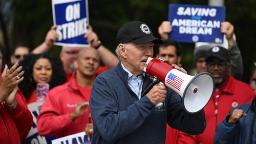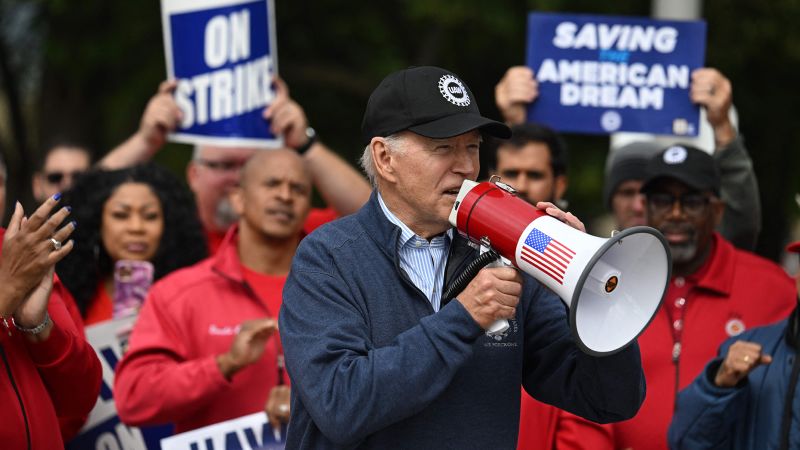
CNN
—
When President Joe Biden joined a picket line of autoworkers in Michigan on Tuesday, the historic moment offered a preview of next year’s election and underscored the president’s longtime commitment to a worker-centric economy.
Biden was visiting a day ahead of the 2024 Republican frontrunner, former President Donald Trump, who is hoping to cut into Biden’s support among blue-collar voters.
The competing visits, one day apart, set up one of the most direct contrasts between the likely rivals as they each increasingly look past the primary season to the general election.
Nearly as soon as the United Auto Workers went on strike earlier this month, Biden voiced support for the workers. Privately, he inquired about joining the picket lines himself.
He also faced pressure from Democrats to appear proactive after publicly predicting earlier this month a strike wouldn’t come to pass.
It wasn’t until the union’s president formally invited Biden last week that he announced he would travel to Michigan on his way to a previously scheduled swing out west.
By then, Trump had already announced his own plans to visit the state – against the union’s recommendation.
Wearing a UAW ball-cap and speaking through a bullhorn, Biden’s overt support for the striking workers was a break from his predecessors’ attempts at neutrality. It offered the most explicit example yet of his bottom-up economic message – one focused on workers and not corporations.
“Now they’re doing incredibly well,” he said of automakers’ profits after receiving federal assistance. “And guess what: You should be doing incredibly well, too.”
For the first time this campaign season, Biden and Trump are competing directly for the same voters, each trying to appeal to union workers on the picket lines in Michigan.
“You deserve a significant raise,” Biden told picketers through a megaphone. “We saved them, it’s about time they step up for us.”
The dueling visits underscore one similarity in otherwise widely divergent political identities: staking out a claim as a champion for the working class. The powerful voting bloc could help decide next year’s election. Biden won Michigan narrowly in 2020, and Trump took the state in 2016.
The two visits occur against different circumstances. Biden was invited by the UAW to join their picket line, and has spoken out forcefully in favor of the workers. Trump, meanwhile, has criticized the union and was warned by its president he wasn’t welcome.
That did not deter him from scheduling a stop in Detroit on Wednesday, meant in part to counter-program the second Republican primary debate in California.
While Trump announced his plans ahead of Biden, the White House insists the president’s visit was not spurred by his predecessor. Instead, White House officials say Biden has voiced interest in joining the picketers since the strike began.
Trump, who is not planning on joining a picket line, will speak instead at a non-union facility. The union doesn’t consider Trump’s event at Drake Enterprises in Clinton Township, Michigan, to be standing in solidarity with the UAW, according to a union source.
The White House believes that split screen will speak volumes.
Biden bills himself the “most pro-union president in history,” but he is still toeing a line when it comes to his support for the autoworkers.
Until Tuesday, he had not voiced explicit support for the union’s demands on major wage increases – though he has said record profits should translate to record contracts.
When a reporter asked Tuesday whether auto workers deserved a 40% pay raise – as they have demanded – workers standing around the president shouted yes. Biden also responded, “Yes.”
That went beyond what the White House has said about the union’s negotiating position.
“We are not involved in negotiations. That is something for them to decide what is going to work for the parties that are involved, but he is standing with the auto workers. That’s what the president is doing,” press secretary Karine Jean-Pierre told reporters ahead of the president’s trip.
He has maintained contact with auto executives, including in a phone call in the days before the strike began. He did not meet with representatives from automakers while he was in Michigan on Tuesday.
A prolonged strike could have major ripple effects throughout the economy, including a spike in car prices and disruptions in the supply chain. Biden has sought to use a strong economy as the basis for his reelection campaign.
Even as Biden clearly sides with the union, presidents typically work to act as a neutral arbiter in labor disputes. Biden himself intervened earlier in his term to prevent a freight rail strike, angering some workers in the process.
Stepping off Air Force One in Michigan, Biden was asked what it would take for him to earn the UAW’s endorsement.
“I’m not worried about that,” he said as he emerged from the plane.
Indeed, the union has traditionally endorsed Democrats and it remains hard to fathom it backing Trump ahead of next year’s election.
Yet it has withheld its endorsement so far, expressing concern about some of the ramifications of Biden’s efforts to transition the US auto fleet to electric. Biden and UAW President Shawn Fain rode together from the airport to the picket line and had a conversation where they talked about workers issues and a “just transition” to electric vehicles, according to a source familiar with the conversation.
Given the union’s current contract negotiations, it is perhaps unsurprising the UAW is holding off endorsing any candidate, hoping to extract the most robust support it can.
Speaking at the picket line on Tuesday, Fain praised Biden for being the first president to join a picket line. And he spoke out harshly against corporate executives.
“They think they own the world,” he said. “But we make it run.”
Biden was the first sitting president to walk a picket line, at least in many presidential historians’ recollections. The White House sought to play up the fact, framing it as history in the making.
It was not the first time Biden joined a picket line. He rallied with striking autoworkers in Kansas City in 2019, pulling on a red UAW shirt to speak from the bed of a pickup truck. And he joined casino workers in Las Vegas pushing for a new contract in 2020.
But as a sitting president, he was entering new territory. While some of his Democratic predecessors voiced support for unions, they approached strikes more warily. John F. Kennedy, for example, allowed federal workers the right to collectively bargain but later warned pilots against striking, citing the potential economic fallout.
During their presidencies, Bill Clinton and Barack Obama both sought to resolve strikes that could have had wide repercussions in the economy.
There are practical reasons previous presidents have sought the appearance of neutrality. The National Labor Relations Board, whose members are appointed by the president but expected to function independently, has 28 pending cases that were filed by the United Auto Workers.

